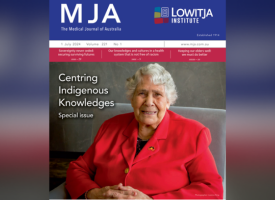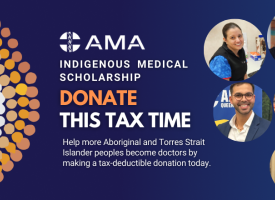AMA Speech - Dr Gannon - Launch 2017 AMA Report Card on Indigenous Health
SPEECH
LAUNCH OF 2017 AMA REPORT CARD ON INDIGENOUS HEALTH
PARLIAMENT HOUSE, CANBERRA
WEDNESDAY 29 NOVEMBER 2017
AMA PRESIDENT DR MICHAEL GANNON
I acknowledge the Ngunnawal peoples as the traditional custodians of the land upon which we meet today. We pay our respects to all Elders past and present, as well as Aboriginal Elders and guests joining us.
The AMA is delighted that the Minister for Indigenous Health, Ken Wyatt, is here to officially launch the Report card. Welcome, Ken.
We are also honoured to have with us:
- Senator Rachel Siewert, further enhancing the strong Western Australian contingent here – I thank you and your staff for organising the launch venue;
- The Shadow Assistant Minister for Indigenous Health, Warren Snowdon;
- Senator Malarndirri McCarthy;
- Ms Julie Tongs, Chief Executive Officer of Winnunga Nimmityjah Aboriginal Health Service;
- Mr Paul Wright, Executive Officer of Close the Gap; and
- Representatives from the Australian Indigenous Doctors’ Association (AIDA), the National Aboriginal Community Controlled Health Organisation (NACCHO), Malpa, the RACGP, political advisers, members of the media, and my colleagues from the AMA.
Since 2002, the AMA has produced an Annual Report Card on Indigenous Health.
Our Report Card series increases the understanding and awareness of the continued health inequalities that exist between Aboriginal and Torres Strait Islander people and non-Indigenous Australians.
It also calls on governments to continue to recognise the unacceptably disproportionate rates of disadvantage experienced by our Aboriginal and Torres Strait Islander communities.
This year’s Report focuses on the impacts of chronic otitis media on the health of Aboriginal and Torres Strait Islander people.
Otitis media is in simple terms, inflammation of the middle ear. It is a very common childhood illness.
It is not a hidden or unknown health problem. We’ve known about the high prevalence of otitis media for over 60 years.
Despite decades of advances in medical services and treatment, and a range of government responses, chronic otitis media remains an endemic, a ‘massive health problem’ in many Indigenous communities.
Rates are now reported to be the highest in the world.
For most non-Indigenous Australian children, otitis media is readily treated with a short course of antibiotics. The condition passes within days or weeks, and without long-term effects.
But for many Aboriginal and Torres Strait Islander people, otitis media is not adequately treated, and persists in chronic forms over months and even years.
It can result in deafness. It can be a ‘life sentence’ of hearing harm for many sufferers.
In the Report, we cite research from Northern Territory Indigenous communities, which found only seven per cent of children assessed had ‘normal’ ears. This is a truly appalling statistic.
Untreated, chronic otitis media leads to significant hearing impairment. This in turn leads to impaired school performance and, potentially, problem behaviours at school.
Too often this can contribute to a sense of hopelessness around the great opportunities that education and, indeed, life can offer. Vulnerable Aboriginal and Torres Strait Islander people might then be one step closer to the drug and alcohol merchants, and the criminal justice system.
You can see how a potentially harmless bacterial infection can, if unchecked, if untreated, literally ruin someone’s life.
Chronic otitis media is a disease of the developing world. It should not be a chronic health problem is a highly-developed country like Australia.
The AMA says that it is time that Australia – one of the healthiest and wealthiest countries in the world – draws a line under the persistent and ignominious ear health crisis occurring in too many of our Indigenous communities.
This year marks a decade of Closing the Gap. Unfortunately, continued efforts have failed to produce sustainable, tangible, and lasting health improvements. We are still seeing diseases and health problems that are entirely preventable.
That is not to say that doctors, nurses, and allied health professionals are not working with tremendous dedication and commitment every day, often in trying and difficult circumstances.
But it is evidence that the health system alone cannot carry the sole burden of an effective response.
Last year, the AMA launched its Report Card at the Danila Dilba Health Service in Darwin.
That was an appropriate platform to address Rheumatic Heart Disease among Aboriginal and Torres Strait Islander people.
This year, we are launching the Report Card here at Parliament House in Canberra – the nation’s capital.
It’s an ideal location because this Report is a message for all members of the Australian Parliament. But it is not just a call to this Parliament, but all State and Territory Parliaments across the land.
This Report Card is a call for action on Indigenous disadvantage – a plea for Governments to agree on the actions needed to address the social determinants that allow such disadvantage to continue.
As I said about RHD a year ago, it is social determinants of health such as poverty; unhygienic and overcrowded living conditions; and an absence of adequate health services that allow chronic conditions to persist at disproportionately high rates in Indigenous communities.
Governments must fund health care on the basis of need. There is no doubt whatsoever that funding and resourcing of Indigenous health does not meet the overall burden of illness.
So now we call on this Parliament to commit to halting the progression of chronic otitis media and the life-long crippling effects it has on the Aboriginal and Torres Strait Islander population.
It is hoped that this Report Card will contribute to closing the gap on the rates of chronic otitis media between Indigenous and non-Indigenous infants and children.
We hope it is a catalyst for a national response to the lasting, disabling effects and social impacts of chronic otitis media on the adult Indigenous population.
I would like to thank Chris Holland for his time and expertise producing this report.
Further, I applaud Associate Professor Chris Perry and Associate Professor Kelvin Kong for their tireless commitment to addressing otitis media among Aboriginal and Torres Strait Islander people.
It is now my great pleasure to ask Minister for Indigenous Health, Ken Wyatt, to officially launch the 2017 AMA Report Card on Indigenous Health.
29 November 2017
CONTACT: John Flannery 02 6270 5477 / 0419 494 761
Maria Hawthorne 02 6270 5478 / 0427 209 753
Follow the AMA Media on Twitter: http://twitter.com/ama_media
Follow the AMA President on Twitter: http://twitter.com/amapresident
Follow Australian Medicine on Twitter: https://twitter.com/amaausmed
Like the AMA on Facebook https://www.facebook.com/AustralianMedicalAssociation



